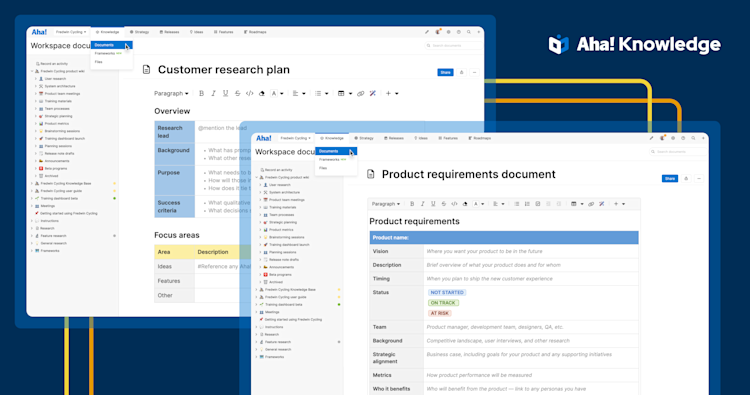
The Aha! team never shies away from tough questions. | Photo by Jodi B Photography
The VP of sales would not stop asking me this
Product management questions come in a few categories. There are the fact-finding basics: "Where is the latest version of the roadmap?" The pointed probers: "Will X be on the roadmap?" Then, there are the thought provokers: "Why are we doing this now?" And the only thing worse than tough questions is the ones that people never ask at all.
Most successful people ask questions all the time. It is how we learn and grow. But asking the same questions regularly usually hints at something else.
For many of us, every day at work can feel like a barrage of nonstop questions. This is especially true if you are a product builder — product folks are at the center of so much information that others in the organization need to know. That means product managers often spend a lot of time playing Q&A catch-up with other teammates, answering the same questions over and over.
I know because it has happened to me many times. Years ago, I worked with a VP of sales who would not stop asking me whether the latest "interesting idea" suggested by a prospect was on the roadmap. I would give the same answer (no, because these random features were usually poorly vetted).
The exchange never ended there. When I volleyed a return question about whether the prospect had committed to actually buying the product if we built this random feature, my query was viewed with disdain. I quickly learned after a few back-and-forths that the VP would then go to the CEO to see if they could get the answer they wanted.
When people keep asking you the same questions, you have to wonder why — both about their motivations and your own culpability in the situation.
In my case, the VP did not like my answer. They were willing to flout the strategic direction we had set and go above me to get their way. I could have stopped there and pushed all the blame onto the VP — but that would have done us both a disservice.
Instead, I took the time to reflect on why this person felt the need to escalate. And in the process, I learned a valuable lesson that I think can help you field the many questions you get every day about status, priorities, and (yes) those random ideas:
Be grateful
It can be hard to feel gratitude when you are interrogated daily. But take a pause before you react negatively. Remember that folks are asking you for information and answers because they need it and you have it — they are invested in your product’s success just as much as you are. In my example, the VP of sales was passionate about what they felt customers needed (even if it was not aligned with our overall product strategy).
Reflect sincerely
Take accountability for your role. It is worth reflecting on why people keep pestering you about the same topics. Sure, some people might just not be self-reliant and will lean on you for every little question. Some might have just forgotten the previous answer or not fully understood it. Or, like my VP, they might not like the answer. You have a duty in all scenarios. Take a step back and ask yourself what gaps exist and how you could do better.
Open up access
You might be hoarding knowledge unintentionally. I realized that I had not given the VP full context behind why we were prioritizing certain features ahead of others. I set up a recurring 1:1 roadmap review so we could identify where priorities diverged and better understand each other. For everyday processes or update questions, I always suggest that product folks invest in creating and maintaining a product knowledge base for internal teams. Then, you can steer people to that knowledge base for the latest. They will know where to look for answers over time.
Share success
Showcase the value of what you are delivering. You can do this by tracking and measuring the impact of your roadmap — sharing how what you have planned and what you are building creates value for the business. Highlight where colleagues brought meaningful insights. Be sure to point out the features suggested by teammates that were well researched, were vetted against strategy, and resulted in a positive outcome. You get to celebrate and throw credit to others while reinforcing desired behaviors.
Sharing and evangelizing product information is integral to your job. It is also your job to give folks what they need to answer some questions for themselves.
Explain the reasoning behind your decisions, make information readily available, and encourage folks to self-serve from the resources you provide. Have designated forums where you can offer perspective and context so folks can get the background they need to keep moving forward. And do not shy away from more advanced conversations. Make it clear that you welcome ongoing dialogue, especially about deeper issues that might affect your plans.
It has been many years since I worked with that VP. But the lessons I learned from the experience have served me well. As the CEO of Aha! today, I not only encourage folks to ask questions, but also encourage the team to do so.
My favorite categories of questions are the unexpected, the insightful, and the rare — the ones that push me, the broader team, and what we are building together to be better.
No question, your team needs tools to succeed. Try Aha! software free for 30 days.




